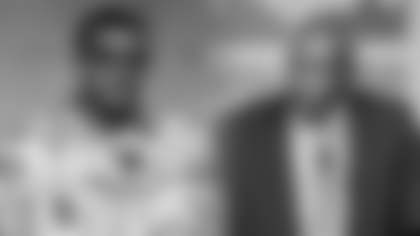It was former NFL Commissioner and Pro Football Hall of Famer Bert Bell who first said, "On any given Sunday, any team can beat any other team."
Those early words about parity in the league, perhaps never rang more true than in the 1968 season when the Denver Broncos visited New York to play the Jets.
The 1968 Jets went on to defeat the heavily favored Baltimore Colts in Super Bowl III in one of the great upset victories in pro football history.
They lost only three games all season, including just one in their home park at Shea Stadium. And that one home loss was to the Broncos on Oct. 13, 1968, by a 21-13 margin.
Considering the much-deserved also-ran status conferred on the Broncos at that time, the victory was truly a game for the ages for the Broncos.
The merger of the National and American Football Leagues had already begun, but the new era of pro football was just on the cusp. The Jets were in just their sixth year wearing green and being called the Jets after being known as the New York Titans. The Broncos were in their seventh year in orange and blue.
Jets owner Sonny Werblin had made a splash heard around the football world with the signing of Joe Namath, as NFL teams rarely lost top talent to AFL teams back then. On this day in October, they had not yet won the world championship, and the youthful quarterback had not yet made his mark as "Broadway Joe." But he was close.
That game featured three future Pro Football Hall of Famers on the Jets: Namath, wide receiver Don Maynard and tackle Winston Hill, and the Broncos would normally have countered with their own future Hall of Famer, running back Floyd Little, but Little was out with an injury that day and the Broncos started Floyd's roommate and Hofstra product Fran Lynch at running back.
It was assumed by all observers that the Jets would have no problem with the Broncos, and indeed, Namath completed 20 passes for 341 yards against Denver and the Jets seemed to march at will against Denver — at times.
Except ...
The Broncos had a magnificent "big-play" game against the Jets.
Denver came into that game having scored no more than two touchdowns in any of their first four games (the Broncos were 1-3), but they scored 21 points against the eventual world champions — two touchdowns on runs of 4 and 6 yards by Lynch and a 72-yard touchdown pass from quarterback Steve Tensi to wide receiver Eric Crabtree.
Tensi completed 10-of-22 passes for 201 yards, but each completion seemed to come at a critical time for Denver.
Future Denver Ring of Fame kicker Jim Turner kicked two field goals for the Jets, but Namath was able to direct just one touchdown drive against the Broncos, with those points coming from a player whom I have always felt had one of the great names in pro football history: Emerson Boozer.
What broke the Jets' back in this game was that the Denver defense picked off Namath five times to create one of the star quarterback's most frustrating days of his early pro career.
Charles Greer had two of the drive-ending interceptions for the Broncos, while Pete Jaquess, Jack Lentz and John Huard each added one for Denver.
Lentz played just two years for the Broncos before becoming a major player on Wall Street, and I was pleased to be in attendance when John Huard was inducted into the College Football Hall of Fame in New York many years later.
But I always thought the real star of the game was Broncos defensive end Rich "Tombstone" Jackson. The early stats of that time in pro football credited Jackson with five passes defensed, an astonishing total for a defensive end.
Jackson, who would become a Broncos Ring of Famer as part of the inaugural class in 1984, had his way all day against the Jets' attempts at pass protection. The quarterback "sack" would not become an official stat until 1982, so it is difficult to piece together how many tackles by Jackson were sacks of Namath, but game stats credited Jackson with seven tackles, besides the five passes defensed.
The head slap, Jackson's infamous move, had not yet been banned from the game, and it seemed like he pressured Namath on every passing attempt. If he was double teamed, Jackson just slapped them both and continued his day-long pursuit of Namath.
When Sports Illustrated published Paul "Dr. Z" Zimmerman's All-Time Team, Jackson earned special recognition as one of the selections at defensive end. Pro football was very East Coast centric at that time, and I have alway felt that Jackson was greatly aided on that selection and others like it by his performances in New York against Namath, watched by Zimmerman.
The year before, the Broncos had also thumped the Jets in New York, 33-24, again with Jackson in fierce pursuit of Namath, and they followed it up with a 21-19 win over the then world-champion Jets in Mile High Stadium in 1969.
So despite going just 5-9 in 1968 (and just 3-11 in 1967 and 5-8-1 in 1969), Denver defeated Joe Namath's Jets three years in a row, twice in New York City.
The defense was the star of the game for Denver on that day in 1968, and while the original schedule had New Yorkers hoping to again see beloved Syracuse star Floyd Little face Joe Namath, many of the 62,052 in attendance at Shea Stadium that day left in awe of the Broncos' defensive end.
Joe Namath is a forevermore superstar in the NFL galaxy, but on one October day in 1968, on his way to becoming Broadway Joe, world champion and the toast of New York City, he fell victim to a defensive attack by Denver that led to one of the Broncos' most memorable wins in their first decade of play.















